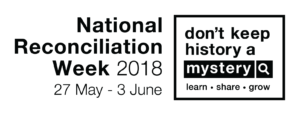National Reconciliation Week is a reminder that Indigenous Australians have faced challenges to educate an Australian public that prefers not to be reminded of the wrongs Indigenous Australians have suffered or of the need for reconciliation, writes ANDY HAMILTON SJ.
The theme of National Reconciliation Week (May 27 – June 3) this year is ‘Don’t keep history a mystery’. The week itself is full of history. May 27 is the 50th anniversary of the 1967 Referendum that allowed Indigenous Australians to be counted in the Census. June 3 recalls the handing down of the 1992 Mabo decision that established the Indigenous rights to land title. National Sorry Day recalls not an event but a continuing scandal: the long history of the Stolen Generations, the Indigenous children who were stripped away from their parents.
 For Indigenous Australians, as for all peoples who have suffered from discrimination and exclusion, history is important. For the Jewish people of Jesus’ time grappling with the period spent in Egypt as slaves and later in Babylon as exiles was central to their story. At the centre of their faith and ritual was God’s action in freeing them from Egypt and leading them into the Promised Land. Similarly, for Christians Jesus’ death and rising from the dead to free us from sin and death lie at the heart of our faith. That is why Jews and Christians spend so much time remembering their history.
For Indigenous Australians, as for all peoples who have suffered from discrimination and exclusion, history is important. For the Jewish people of Jesus’ time grappling with the period spent in Egypt as slaves and later in Babylon as exiles was central to their story. At the centre of their faith and ritual was God’s action in freeing them from Egypt and leading them into the Promised Land. Similarly, for Christians Jesus’ death and rising from the dead to free us from sin and death lie at the heart of our faith. That is why Jews and Christians spend so much time remembering their history.
This is true also of Indigenous Australians. The central events of their recent history are of being driven off the land of which they had been part for thousands of years. Their loss is crystallised in the story of the stolen generations. So much was stolen from them in the arrival of the European settlers – land, camping grounds, sacred sites, access to food, culture, their numbering among Australians. And to cap it all, their children were also stolen.
This history is the inheritance of our Indigenous workers and of the Indigenous young people whom we serve at Jesuit Social Services. They bear in their lives its marks, as we all bear the marks of our history. For all of us it is a spur to make the future one of reconciliation.
Our shared history, of course, has also included moments of recognition and of restoration. Among these were the vote to recognise them in the Australian Census, the Mabo decision that recognised their original title to the land, and the Apology to the Stolen Generations. These events had mainly symbolic value, but they also encouraged Indigenous Australians to press for recognition in Australian institutions of their unique status in Australia. The challenge they have faced is to educate an Australian public that prefers not to be reminded of the wrongs Indigenous Australians have suffered or of the need for reconciliation.
For these reasons it is important for all Australians not to keep our history a mystery. Catholics, for whom God’s action in our world is a mystery that draws us beyond what we can understand or hope for, are invited to allow history to be a mystery in the full sense of the word. It is more than a dry recital of dates, places and events. It is the story of humanity that makes a claim on us all – of good and evil, of suffering and resilience, of crime and reconciliation, of contempt and respect. This story takes us beyond what we can measure to what as Australians we value.


